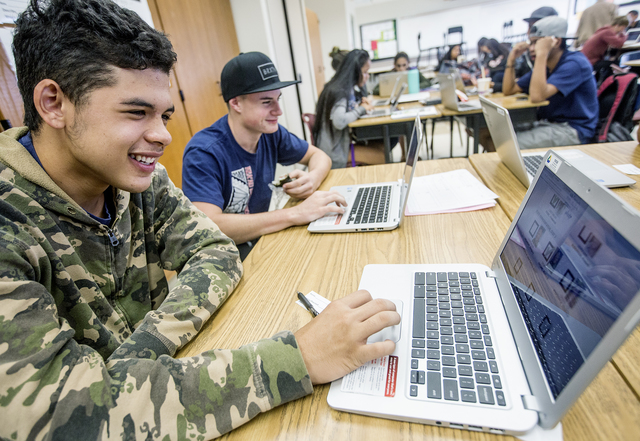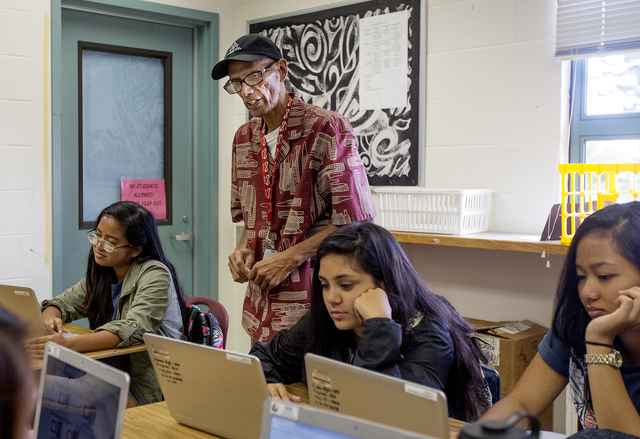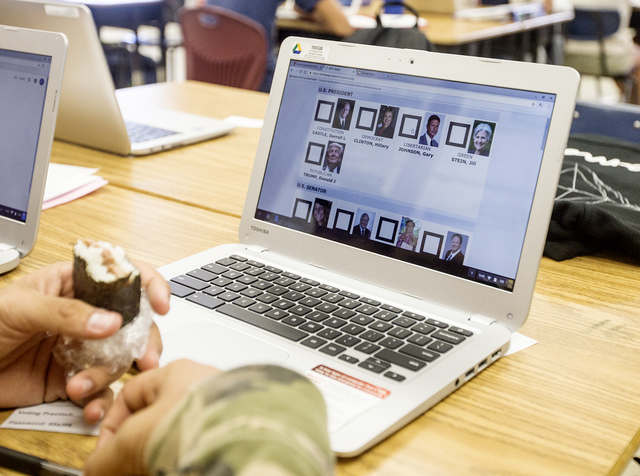Politics aren’t relevant. They’re boring. Many teens are “focused on other things.” ADVERTISING Politics aren’t relevant. They’re boring. Many teens are “focused on other things.” At least that’s what some East Hawaii high school students said when asked why so
Politics aren’t relevant. They’re boring. Many teens are “focused on other things.”
At least that’s what some East Hawaii high school students said when asked why so few young people seem to follow local elections and political issues.
“(As students) we’re not really told that much about it,” said 16-year-old Kaitlyn Khan, a senior at Keaau High School. “If we are told about it, it’s probably from our parents. But if not, we don’t hear that much about it.”
That wasn’t the case Wednesday, however, as Khan, along with about 25 of her Keaau High peers, spent part of the morning researching candidates in upcoming county, state and national political races.
The teens — though still too young to vote — were preparing to cast mock ballots that morning as part of We Vote Hawaii, a nonpartisan nonprofit organization that administers an online election for Hawaii’s K-12 public, private and home-schooled students.
Students cast ballots nearly identical to those of their parents. Results will be posted at 6 p.m. Tuesday, when regular polls close.
We Vote Hawaii, affiliated with the national Kids Voting USA, hosts the youth voting program each election. Ultimately, it hopes to bolster adult voter participation and encourage youth — once they are of age — to vote.
More than 120,000 Hawaii students cast mock ballots in 2012, according to the organization’s website. This year, every East Hawaii traditional public school — as well at least one public charter school — is participating.
“(We Vote Hawaii) really thinks it’s important to promote citizen participation,” said Claudia Kobayashi, East Hawaii district coordinator for the organization. “It really wants to encourage discussion and emphasize the importance of voting and citizen knowledge and being an educated voter and how important that is to our democracy.”
Nationwide, fewer young people are voting. In 2012, 45 percent of eligible U.S. residents ages 18-29 cast ballots, down from 51 percent in 2008. In Hawaii, 30.5 percent of those 18-29 voted in 2012, compared to 56.4 percent of those older than 30.
Hawaii also had the lowest overall voter turnout in the country in 2008, and tied for last place in 2012. In August, the state set a record-low turnout when just 34.7 percent of registered voters cast ballots in the primary election, down from the previous 36.9 percent low in 2008.
The state even passed a law in 2014 allowing same-day voter registration — ultimately hoping to help improve turnout.
“To me, I think it’s horrendous what the adults have not been doing,” said Kawaileleohi‘ilawe, a history teacher at Keaau High leading the We Vote Hawaii effort Wednesday. “They’re not participating. They need to rise up to the level of these future voters.”
Kawaileleohi‘ilawe, who is addressed by a single name, said he thinks that low-turnout trend is starting to turn around, at least what he sees among his more than 200 students. The upcoming presidential election also has “brought up a lot of interest in the kids,” he said.
“They’ll want to know, ‘Is what (Donald Trump) saying true?’” Kawaileleohi‘ilawe said. “Or, ‘What are other people saying? Are they bringing up facts or is it based on opinion?’ It’s raising questions, so I think it’s great.”
Keaau juniors Ryan McGrath and Kelii Bajo, both 16, agreed the upcoming presidential race piqued their interest. Bajo said he’s torn between both presidential candidates — he really doesn’t like either and “doesn’t want World War III to happen.” McGrath said he’s leaning more toward Hilary Clinton.
Both said they were glad to get a taste of civic engagement Wednesday.
“I think it’s good (to learn about political issues) because pretty soon we’re going to be adults,” McGrath said. “And then we’ve got to make our own decisions.”
Email Kirsten Johnson at kjohnson@hawaiitribune-herald.com.





